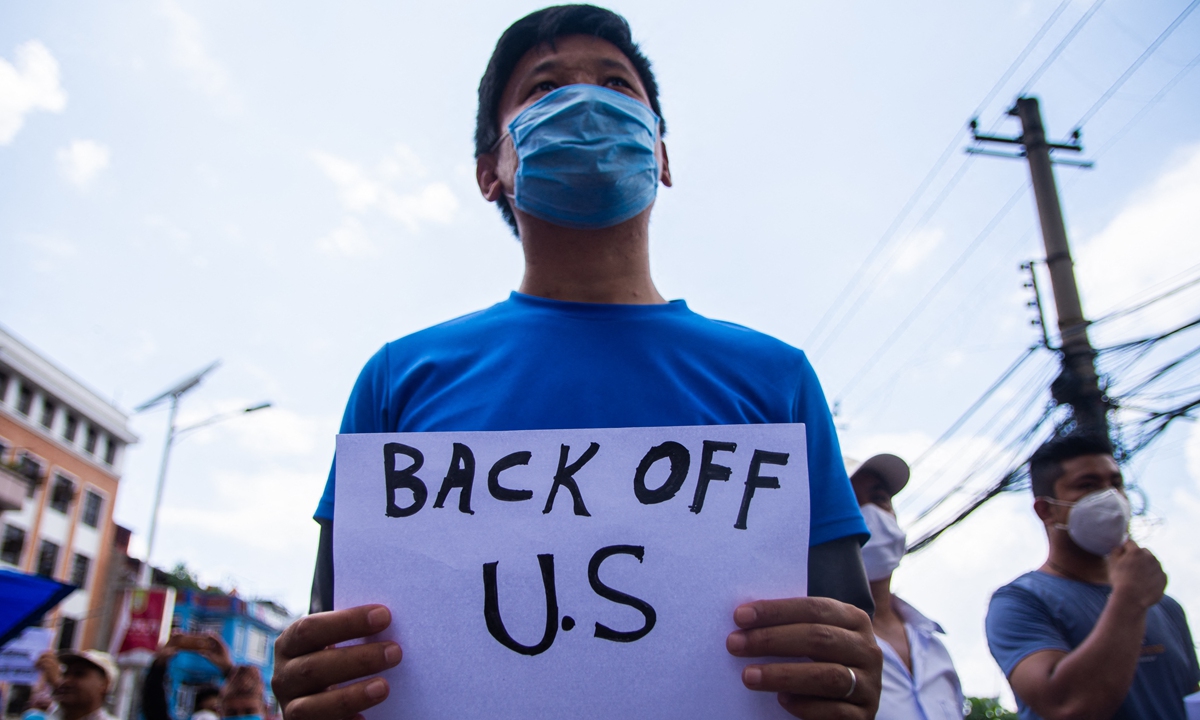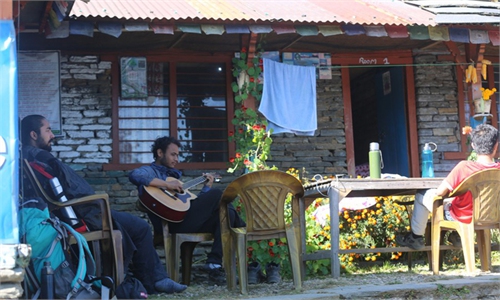IN-DEPTH / IN-DEPTH
New Nepali govt expected to initiate balanced foreign policy, thwart US' ambitions to draw it into Indo-Pacific Strategy
Changing the tide

A Nepali man holds a playcard in a protest against the Millennium Challenge Corporation (MCC) agreement between Nepal and the US in Kathmandu, Nepal on June 27, 2020. Photo: AFP
With an eye on China, the US undersecretary of state for political affairs Victoria Nuland met with Nepal's newly elected Prime Minister Pushpa Kamal Dahal and discussed bilateral ties with him in Kathmandu on January 30. Some experts said the move reflects the US' uneasiness coupled with tensions over Nepal's "unfavorable electoral result" in the eyes of the US.
Nuland is the most senior foreign official to travel to Nepal since Chairman of the Communist Party of Nepal (Maoist Center) Pushpa Kamal Dahal, widely known as Prachanda, was sworn in as Prime Minister on December 25, 2022, which many anticipated would spell a potential soft foreign policy shift in the Himalayan nation. Observers told the Global Times that the general election outcome has in great part fueled Nuland's rapid-fire diplomacy.
On January 10, Dahal won a vote of confidence in the country's Parliament. In a rare case in Nepal's political history, Prachanda is the first Prime Minister to receive a 99 percent endorsement.
According to an agreement reached, Dahal and his current ally KP Sharma Oli of the Communist Party of Nepal (Unified Marxist Leninist) will share power. Dahal shall be the first to take on the premiership, serving a term of two and a half years, after which Oli shall take over.
Dahal's election victory means that former prime minister and Nepali Congress Party chief Sher Bahadur Deuba, who had been backed by the US and India, will not be in the cabinet. Many diplomats, academics, and Indian media sources are concerned about the impact on US interests in Nepal if the new government takes office.
Many observers saw it as a failed attempt by the US to interfere in Nepal's internal affairs, and the dashing of a dream to use Nepal to contain China by the US. The result also portends a possible decline of American influence in Nepal.
Political analysts from China and Nepal believe that the new administration in Nepal will lead to a more balanced foreign policy and seeking out of more practical cooperation with China.
The trend seems to be a source of anxiety in the US. Media sources reported that Samantha Power, the head of the US Agency for International Development, will also visit Nepal this month, followed by another senior US official, Afreen Akhter.
The frequent visits by senior American officials may be intended to further coax the new government into bowing to its influence by offering Nepal some financial aid. This shows that the US is nervous about the future ideological direction of Nepal, Qian Feng, director of the research department at the National Strategy Institute at Tsinghua University, told the Global Times.

A group of people ride motorcycles through Patan Durbar Square, Kathmandu, Nepal. Photo: VCG
Nepal's further pragmatic and friendly attitude toward China will frustrate the US' early investment in incorporating Nepal into its Indo-Pacific Strategy, Qian said.The Indian English newspaper Deccan Herald bluntly said in a piece on December 27, 2022, that the US-backed Deuba, and the US has been aiming to "prevent the coming together of Prachanda's Communist Party of Nepal (Maoist Centre) and another former prime minister Sharma Oli's Communist Party of Nepal (Unified Marxist-Leninist)." The report stated that "the US' fear of Communists is easy to understand because the two Left parties had been opposing the US' MCC fund, a US$500 million pledge for infrastructural development. They suspected it had hidden security dimensions."
Additionally, during Nepal's parliamentary elections in November, US and Indian ambassadors met Deuba and Prachanda frequently, in the hope that their previous alliance would remain intact, Indian Express reported.
"Among the mainstream political parties in Nepal, the Congress Party was not very positive toward China when it was in power. Its election program even claimed that it would solve the groundless so-called China-Nepal border conflicts. While the Communist Party of Nepal (Unified Marxist Leninist) emphasizes cooperation with China in the party's election platform," Zhang Shubin, director of the Nepal Studies Center at the Hebei University of Economics and Business, told the Global Times.
The new alliance is expected to lead Nepal to stability and prosperity. On the whole, this is conducive to the development of China-Nepal relations, Zhang analyzed.
"For a long time, America's desire was to form a government without Maoists. They hope to see a government of non-communists under the leadership of Congress. But now, it is a blow to the US," Prem Sagar, president of the Kathmandu-based Nepal-China Mutual Cooperation Society, told the Global Times, while expecting a decline of American influence in Nepal.
"Overall, it seems that the American plan did not work in the latest political changes in Nepal. This incident completely failed the US in its micromanagement of Nepal," said Sagar.
Lin Minwang, a professor at the Institute of International Studies at Fudan University, told the Global Times that the Nepali Congress Party has always been more pro-US and pro-India, while Nepal's leftist parties, including the Communist Party of Nepal (Maoist Centre), attach importance to national independence and have a stronger sense of sovereignty, and are dissatisfied with the outside infiltration and manipulation of Nepal.
Nepal's new government may move a little closer to China, but on the whole, Nepal will remain neutral and non-aligned in its diplomacy, and neither party will be completely on one side, said Lin.
Zhang also suggested that Nepal's new government should roll back the Congress Party-led former government's overly pro-India and pro-US policies and become friendlier toward China.
"In general, however, the Nepali government will maintain 'equidistant' diplomacy, while trying to strike a balance between its two big neighbors and Western countries, in order to maximize its national interests, he noted.
Some suspected that the Millennium Challenge Corporation (MCC) and the State Partnership Program (SPP), both of which the US wants to advance in Nepal, could be affected.
The MCC, suspected to be a means of establishing US military bases in Nepal, has been met with widespread criticism and local protests.
The US has long been attempting to draw Nepal into its Indo-Pacific Strategy map designed to counter China. Under great pressure and threats from the US, Nepal's government ratified the $500 million MCC grant in March 2022, a move widely believed to serve as the US' attempted pushback on China's infrastructure investments.
After pushing Nepal to approve the MCC economic pact in March 2022, the US urged the Himalayan country to join its SPP military alliance, which is widely believed to be another component of the US' Indo-Pacific Strategy, despite Washington's denial while terming it as development assistance.
The Nepali government, due to overwhelming backlash from the public, announced on June 20, 2022, that it would not move ahead with the SPP as it could bring harm to the country, though many suspect that the deal is yet to be fully abandoned amid the US' underlying efforts.
The MCC is more likely to be less aggressively implemented than it had been in the past, while the SPP is less likely to be approved by the new government, Nepali experts said.
Former governments already rejected the SPP, and Nepal will continue to decline American proposals of entering into strategic partnerships, Balmukunda Regmi, a professor at Tribhuvan University, Nepal, told the Global Times. "Nepal will continue its cooperation with the US. But Nepal will remain vigilant against interferences in its domestic or foreign policies."
Influenced by internal and external factors, traditional political parties in Nepal, including the Nepali Congress Party, have been in closer contact with India and the US in recent years. However, under the changes in the new era, Nepal increasingly feels China's goodwill and values China's influence. Therefore, the new government will pay more attention to developing practical cooperative relations between China and Nepal , Qian suggested.
Out of national interests, Nepal values both the global influence of the US and good-neighborly relations with China, avoiding the tendency to take sides for the sake of one against another, Qian said.
"China respects the words and deeds of small countries, upholds the principle of never interfering in other countries' internal affairs, and has sincerely helped Nepal to realize its policy of transforming from a land-locked country to a land-linked country, which is widely welcomed by people from all walks of life in Nepal. It is believed that the new Nepali government will attach more importance to developing practical cooperative relations while maintaining a relative strategic balance among China, India, and the US," Qian noted.

